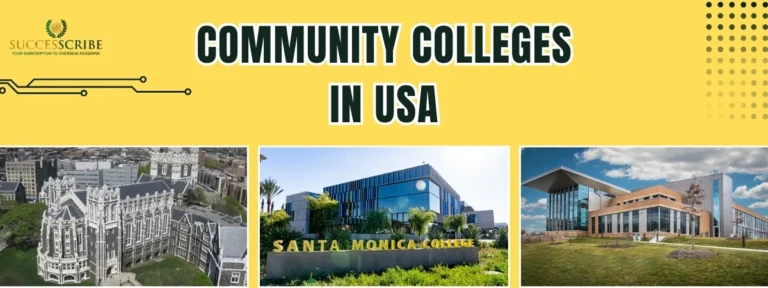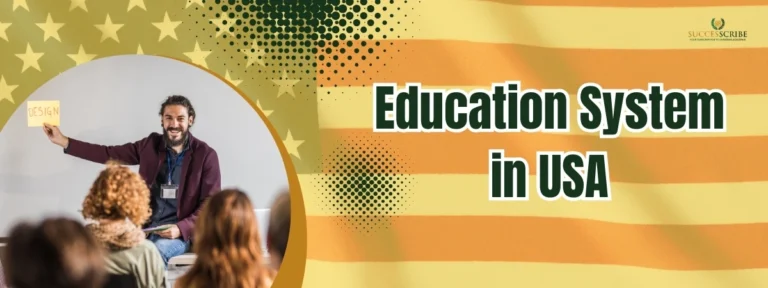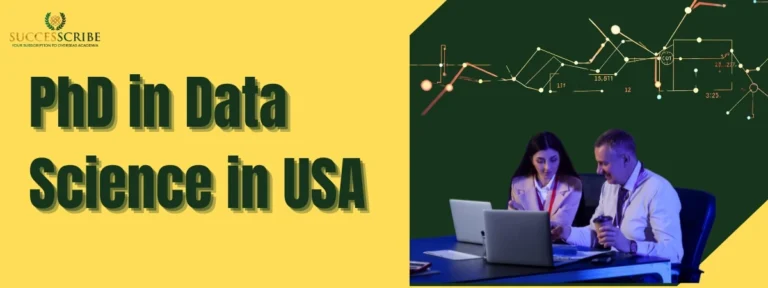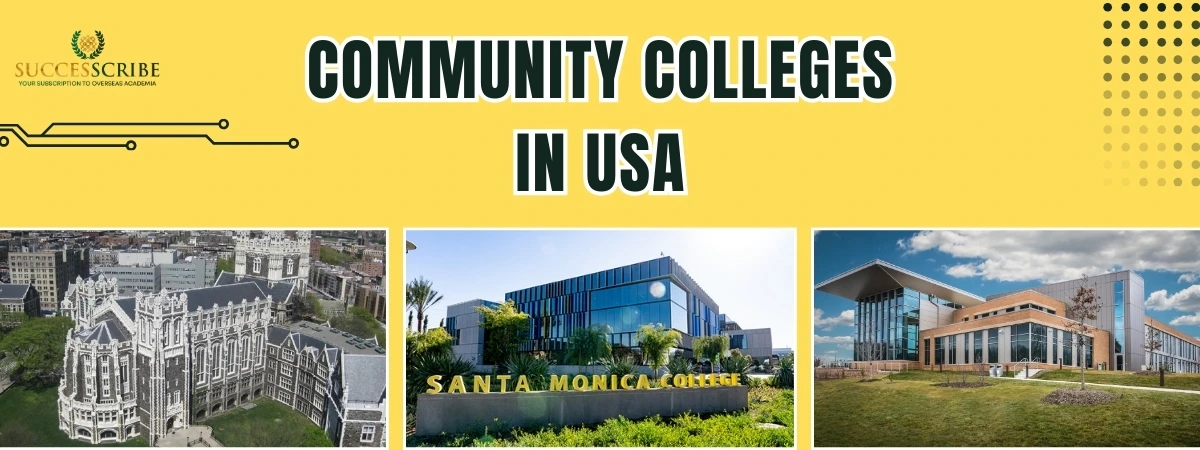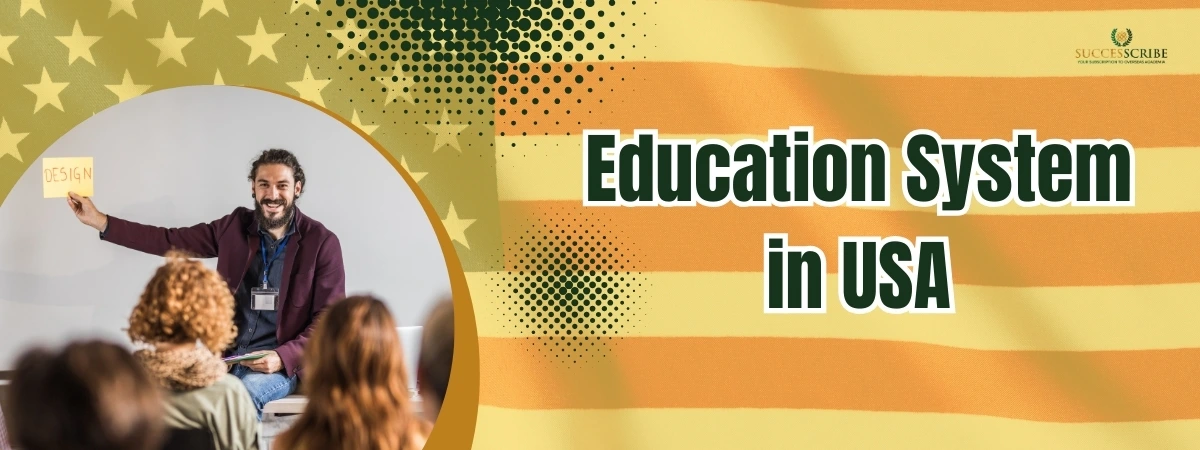Founded in 1828 as the Saxon Technical School, TU Dresden evolved into the Royal Saxon Polytechnic Institute by 1871, eventually adopting the name Technische Universität Dresden in 1961. Today, it is one of Germany’s largest universities with around 32,000 students, 17 faculties across five academic schools, and nearly 6,000 academic staff.
TU Dresden has played a central role in shaping technical education and research in Germany. Early offerings included mechanical engineering and shipbuilding. Over time, non-technical fields like languages and history were integrated, making it a truly full-spectrum institution. The university is a core member of TU9, the elite group of nine major technical universities in Germany.
Academic Reputation & Global Rankings of TU Dresden
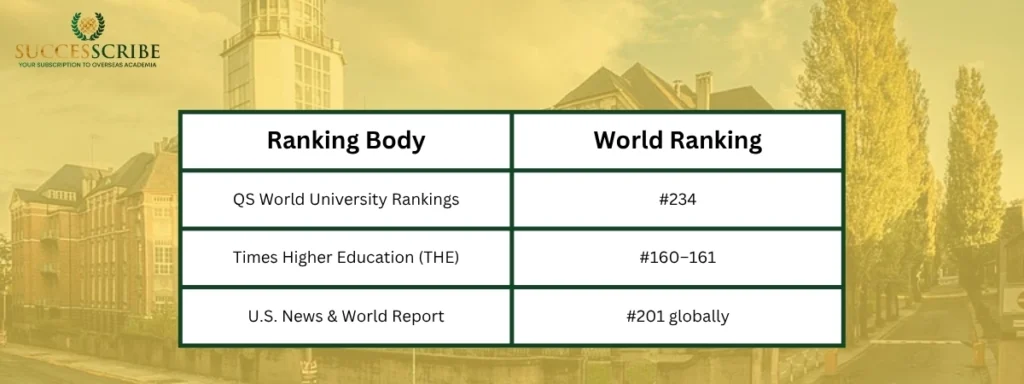
TU Dresden stands tall as one of Germany’s most prestigious and research-intensive universities, consistently recognized for its academic excellence across engineering, natural sciences, and technology. As a member of the elite TU9 group, Germany’s top nine technical universities, it upholds a tradition of innovation, interdisciplinary research, and global collaboration.
Global University Rankings (2024–2025)
| Ranking Body | World Ranking | Subject Strength |
| QS World University Rankings | #234 | Top 100 in Engineering, Materials Science, Physics |
| Times Higher Education (THE) | #160–161 | High impact in Research & Industry collaboration |
| U.S. News & World Report | #201 globally | Renowned for Engineering, CS, and Physical Sciences |
Subject-Specific Excellence (QS Rankings)
- Mechanical, Aeronautical & Manufacturing Engineering: Ranked #84 worldwide
- Physics & Astronomy: Ranked #96
- Materials Science: Ranked #33 globally
- Computer Science & Information Systems: Top 100 in Europe
- Biological Sciences, Chemistry, and Psychology: Consistently high-ranked in Europe
Recognition as a University of Excellence
TU Dresden is one of the few German institutions awarded the prestigious “University of Excellence” title under the German Federal Government’s Excellence Strategy. It hosts three Excellence Clusters and a top-tier Graduate School, highlighting its leadership in:
- Nanoelectronics & Microelectronics
- Regenerative Medicine & Biotechnology
- Advanced Materials & Engineering Sciences
This distinction not only brings in substantial funding but also reinforces TU Dresden’s role as a trailblazer in global scientific innovation.
TU Dresden Top Computer Science Ranking
TU Dresden consistently ranks among the top technical universities in Germany and Europe for Computer Science
| Ranking Platform | Computer Science Ranking |
| QS World University | #251–300 globally in CS |
| Times Higher Education (THE) 2024 | #176–200 in CS |
| CHE Ranking (Germany) | Top 10 |
Suggested Post: Heidelberg University Acceptance Rate
Want to Study in Germany?
Start your journey with Successcribe’s free expert guidance
Book a Free Session NowPrograms & Faculties at TU Dresden
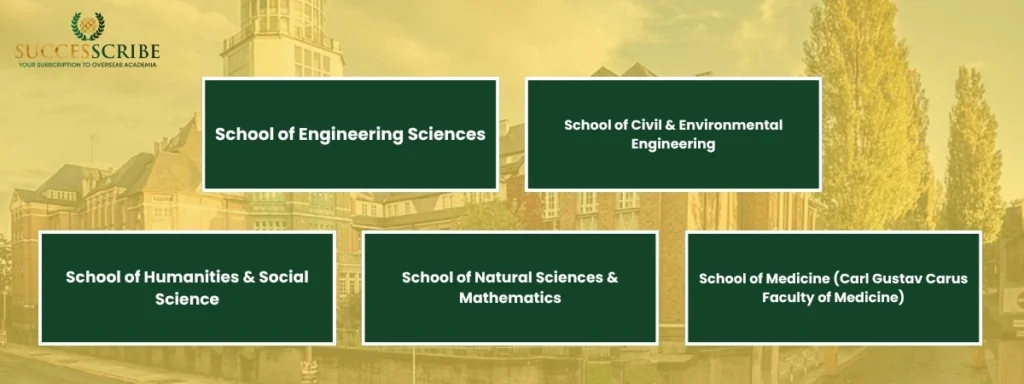
TU Dresden stands out as one of Germany’s most comprehensive universities, offering an impressive range of academic programs across disciplines, engineering, humanities, natural sciences, and medicine, all backed by world-class research and teaching facilities.
Faculty Structure
The university is organized into 17 faculties, grouped into five major academic schools:
- School of Engineering Sciences
- Mechanical Science and Engineering
- Electrical & Computer Engineering
- Transport & Traffic Sciences
- School of Civil & Environmental Engineering
- Architecture
- Civil Engineering
- Environmental Sciences
- School of Humanities & Social Science
- Philosophy
- Education
- Linguistics, Literature & Cultural Studies
- Law
- Business and Economics
- School of Natural Sciences & Mathematics
- Physics
- Chemistry and Food Chemistry
- Mathematics
- Psychology
- School of Medicine (Carl Gustav Carus Faculty of Medicine)
- One of Germany’s top-ranked medical faculties, offering cutting-edge clinical and biomedical programs.
Suggested Post: Technical University Berlin Acceptance Rate
Programs in English (International Focus)
TU Dresden offers several English-taught Master’s programs that are globally competitive and highly interdisciplinary:
| Program | Faculty | Duration | Instruction Language |
| Nanoelectronic Systems | Electrical & Computer Eng. | 2 yrs | English |
| Distributed Systems Engineering | Computer Science | 2 yrs | English |
| Computational Modeling & Simulation | Computer Science | 2 yrs | English |
| ACCESS (Structural Engineering) | Civil Engineering | 2 yrs | English |
| Hydro Science & Engineering | Environmental Sciences | 2 yrs | English |
| Cartography | Environmental Sciences | 2 yrs | English |
| Tropical Forestry & Management | Environmental Sciences | 2 yrs | English |
| Air Transport & Logistics | Transport & Traffic Sc. | 2 yrs | English |
| Public & International Economics | Business & Economics | 2 yrs | English |
Suggested Post: RWTH Aachen University top courses
Acceptance Rate & Admission Process – TU Dresden
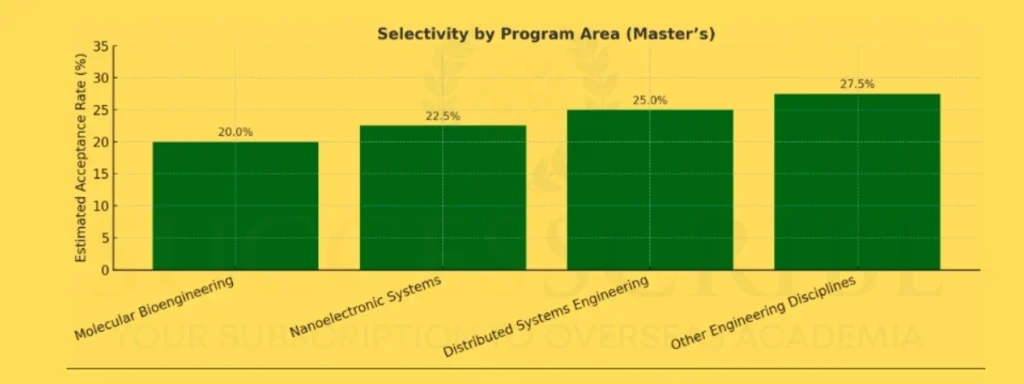
TU Dresden is a prestigious, research-intensive university with competitive yet broadly accessible admissions, especially for non-EU applicants.
Acceptance Rates Overview
- Overall acceptance: Estimated at 46%, meaning roughly 46 out of 100 applicants are admitted.
- Graduate (Master’s) programs: Typically more selective, with acceptance estimated 20–30% depending on program competitiveness and applicant qualifications.
- Undergraduate (Bachelor’s): For international (non‑EU) applicants, acceptance ranges 25–35%, especially in high-demand programs with grade thresholds
Selectivity by Program Area (Master’s)
| Program Area | Estimated Acceptance Rate |
| Molecular Bioengineering | 20% |
| Nanoelectronic Systems | 20–25% |
| Distributed Systems Engineering | 22–28% |
| Other engineering disciplines | 25–30% |
Suggested Post: Ludwig Maximilian University of Munich
Tuition & Cost of Attendance at TU Dresden
Studying at TU Dresden is not only a gateway to world-class education but also an affordable choice for international students compared to other Western countries.
Tuition Fees
As a public university in Germany, TU Dresden does not charge tuition fees for most undergraduate and consecutive Master’s programs, regardless of nationality.
| Program Type | Tuition Fees |
| Bachelor’s (Public) | €0 per semester |
| Master’s (Consecutive) | €0 per semester |
| Master’s (Non-consecutive) | Up to €5,000 – €8,000/year |
| PhD Programs | No tuition fees (only semester contributions) |
Non-consecutive programs may charge fees depending on specialization and admission pathway.
Semester Contribution
Although there are no tuition fees, students are required to pay a semester contribution which helps cover administrative services, public transportation, student union, and cultural facilities.
| Component | Approximate Cost (per semester) |
| Basic Student Services | €90 – €100 |
| Public Transport Ticket | €160 – €180 |
| Student Union Contribution | €90 – €100 |
| Total | €280 – €370 per semester |
This includes unlimited travel on local and regional public transport in and around Dresden.
Suggested Post: Technical University of Munich tuition fees
Living Costs in Dresden
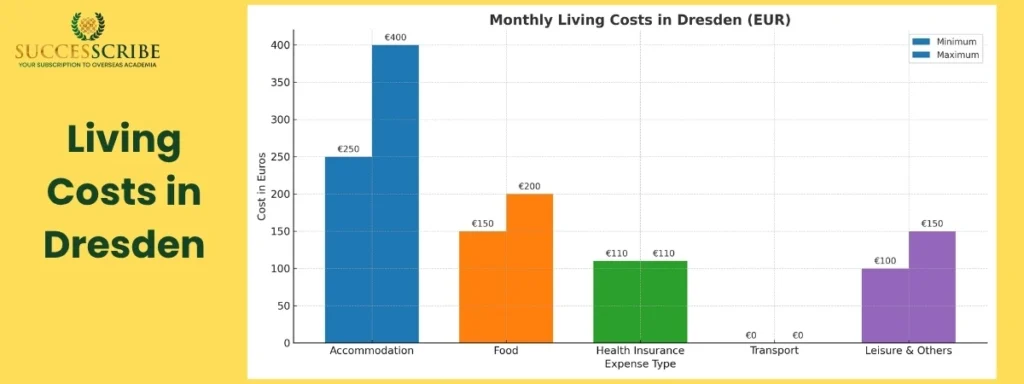
Dresden is one of the most affordable major cities in Germany for students.
| Expense Type | Monthly Estimate (EUR) |
| Accommodation | €250 – €400 |
| Food | €150 – €200 |
| Health Insurance | €110 |
| Transport (covered) | €0 |
| Leisure & Others | €100 – €150 |
| Total Monthly | €600 – €850 |
| Total Yearly | €7,200 – €10,000 |
Students with a German blocked account must show financial proof of €11,904/year (as of 2025) to obtain a visa.
Suggested Post: Free University of Berlin Scholarships
TU Dresden Scholarships for International Students
TU Dresden offers a range of scholarship and funding options for international and domestic students alike, focusing on merit, financial need, and academic or cultural engagement.
1. Deutschlandstipendium (Germany Scholarship)
- Amount: €300/month (150 € from federal government + 150 € from private sponsors)
- Eligibility: High academic achievement and/or exceptional personal or social engagement, irrespective of nationality or financial background
- Duration: Typically 12 months (can be renewed based on merit)
- 2025 Cycle: Open for applications from July 1 to July 15, 2025 via the TU Dresden scholarship portal
- Participation: Over 350 scholarships awarded in 2025 through more than 116 sponsors, TU Dresden’s highest number ever.
2. DAAD‑STIBET Scholarships via TU Dresden
Funded jointly by DAAD and TU Dresden’s International Office:
STIBET Program Streams:
- Matching Funds Scholarship (for final thesis semester or near completion): €300/month for up to six months
- Scholarship for Highly Committed Students (for participation in TU Dresden international activities): €300/month for up to three months.
- Study Completion Scholarship (for thesis period): €300/month for three months; eligibility typically requires ≥ 75% of course credits completed.
Eligibility: Currently enrolled non-EU students (with GPA around 2.5 German equivalent), committed to TU’s activities and nearing degree completion.
3. SECAI Scholarships (AI-Focused Funding)
- Purpose: Support exceptional Master’s students planning to study Artificial Intelligence or adjacent fields at TU Dresden or Leipzig University.
- Award: Covers living costs to enable focused academic work and networking opportunities. Special emphasis on diversity and inclusion. Women in STEM and high-merit students are specifically encouraged to apply.
4. DAAD Postgraduate & STEM Scholarships
- Overview: TU Dresden is among Germany’s top recipients of DAAD funding, ranked 3rd in DAAD scholarship awards nationally.
- Focus: DAAD offers competitive scholarships for Master’s and PhD studies, particularly in STEM, architecture, and development studies. Application deadlines typically fall in October–November for entry in the following year.
Suggested Post: Sports management courses in Germany
Apply to Top German Universities
Make your application simple and stress-free with Successcribe
Get Expert Help NowTU Dresden Application Deadlines
Applying to TU Dresden requires careful attention to application timelines, as they vary depending on the program type (Bachelor’s, Master’s), language of instruction (German or English), and applicant status (EU or non-EU).
Bachelor’s & Diplom Programs (Winter Semester 2025-26)
- Application Portal Opens: Early May 2025
- Application Deadline (Non-EU students): July 15, 2025
- Application Deadline (EU/German students): July 15, 2025
- Semester Begins: October 1, 2025
Master’s Programs (Taught in English – Winter Semester 2025-26)
For Master’s programs, deadlines may differ by faculty. Here are a few examples of popular courses:
| Program Name | Application Deadline (Non-EU) |
| MSc Computational Logic | May 31, 2025 |
| MSc Distributed Systems Engineering | July 15, 2025 |
| MSc Nanoelectronic Systems | May 31, 2025 |
| MSc Molecular Bioengineering | May 31, 2025 |
| MSc Advanced Computational and Civil Engineering Structural Studies (ACCESS) | May 31, 2025 |
Always check the official TU Dresden website or the uni-assist portal (if applicable) as some programs may have earlier deadlines or rolling admissions.
Summer Semester 2026 (For select Master’s programs)
- Application Deadline (Non-EU Students): January 15, 2026
- Semester Begins: April 1, 2026
TU Dresden: Partnerships & Collaborations
TU Dresden excels in forging powerful synergies through academic alliances, industrial ties, and regional innovation networks:
DRESDEN‑concept
- An official research alliance led by TU Dresden, along with 40+ institutions, including Max Planck, Fraunhofer Institutes, Helmholtz, cultural centers, and the University Hospital.
- Created in 2010, it fosters shared infrastructure, coordinated research projects, and cross-disciplinary excellence.
- Supports initiatives like DDc Summer Schools, shared labs (e.g. BioDIP platform), and the DDc Welcome Center for international scientists.
Academic Partnerships
- TU Dresden maintains over 300 international partnerships across 70+ countries, supporting interdisciplinary and double-degree programs.
- Key collaborations include universities such as MIT, University of Oxford, POSTECH, and select Indian Institutes of Technology (IITs).
Industry & Innovation Ecosystem
- Central to Silicon Saxony, one of Europe’s largest semiconductor clusters, where TU Dresden students and researchers engage with companies like GlobalFoundries, Infineon, Bosch, and SAP.
- This industrial presence powers internship programs, R&D partnerships, and joint innovation initiatives, benefitting students and faculty alike.
TU Dresden: Graduate Employability
TU Dresden consistently prepares students for successful careers through targeted support, real-world training, and strong employer connections:
Employability Ranking
- While TU Munich, Humboldt, and LMU lead THE’s 2025 Graduate Employability list in Germany, TU Dresden holds a respectable national employer recognition (#20 among German institutions).
- Its TU9 affiliation underscores strong alignment with industry and high employability in engineering and tech sectors.
Career Infrastructure
- European Employment Ranking (#246 globally), TU Dresden ranks among the top for influencing employer reputation, alumni outcomes, and partnerships per faculty.
- The Career Service organizes job fairs, networking events, CV workshops, and connects students with internships and full-time roles across tech companies and research centers.
Industry Opportunities
- Proximity to high-tech firms in Dresden and the Silicon Saxony cluster ensures access to industry internships and collaborative projects in AI, microelectronics, embedded systems, and mobility technologies.
- TU Dresden also nurtures entrepreneurship via student startup programs like dresden|exists, offering mentoring and seed funding.
Alumni Outcomes & Visibility
Graduates from fields like Computer Science, Electrical Engineering, Transport Systems, Biotechnology, and Physics regularly secure roles at Infineon, GlobalFoundries, Volkswagen, BMW, SAP, Intel, and prominent research institutes such as Fraunhofer and Max Planck.
Suggested Post: TOEFL accepting universities in Germany
Campus Life & Infrastructure at TU Dresden
TU Dresden offers a modern, sustainable, and student-centric campus environment, designed to nurture academic success, innovation, and personal well-being.
Modern Infrastructure
- Smart Classrooms & Digital Labs: Advanced learning environments powered by tech.
- Research Facilities: Over 30 interdisciplinary research centers, including nanotechnology and bioengineering labs.
- Library System: SLUB Dresden is one of Germany’s largest academic libraries, offering 5+ million resources.
Student Amenities
- Affordable Housing: Dormitories and shared flats managed by Studentenwerk Dresden.
- Dining Options: Multiple Mensa cafeterias serve fresh, affordable meals.
- Transportation: Semester ticket provides free access to city-wide public transport.
Campus Life
- Over 100 student clubs in music, tech, art, entrepreneurship & sports.
- International Student Office (Akademisches Auslandsamt) ensures smooth integration for global students.
- Events & Festivals: TU Campus Summer Festival, Startup Week, and career fairs keep the student life buzzing.
Suggested Post: Highly demanded jobs in Germany
Notable Alumni of TU Dresden
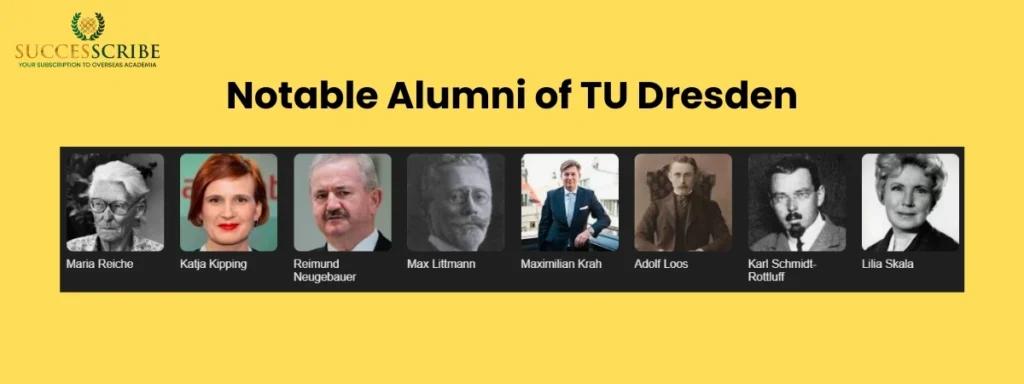
TU Dresden has nurtured a diverse array of brilliant minds who have gone on to make significant contributions in science, politics, engineering, arts, and business, both in Germany and across the world. Its strong academic culture and innovation-driven environment have created leaders and changemakers.
| Name | Field | Notable Contribution / Role |
| Richard Riemerschmid | Architecture & Design | Pioneer of the German arts and crafts movement; acclaimed architect and designer |
| Eva-Maria Stange | Politics & Education | Former Saxon Minister of Science and the Arts; advocate for academic and educational reform |
| Peter Grünberg | Physics | Nobel Prize in Physics (2007) for discovering Giant Magnetoresistance (GMR) |
| Hartmut Mehdorn | Business & Transport | Former CEO of Deutsche Bahn and Air Berlin; key figure in Germany’s transport infrastructure |
| Heinrich Barkhausen | Electrical Engineering | Discovered the Barkhausen effect; foundational work in magnetism and electrical signal theory |
| Jan Woerner | Space & Aerospace | Former Director General of the European Space Agency (ESA) |
| Manfred von Ardenne | Physics & Invention | Renowned inventor and physicist; contributed significantly to electron microscopy and TV tech |
| Martin Dulig | Politics | Saxon State Minister for Economic Affairs, Labour and Transport |
| Karlheinz Brandenburg | Audio Engineering | Key developer of MP3 audio format; revolutionized digital music |
Conclusion
TU Dresden stands as a pillar of academic excellence, innovation, and global relevance. With its deep-rooted tradition in engineering and sciences, the university blends world-class research with modern infrastructure and strong industry collaborations. Whether you’re looking for affordable, high-quality education, hands-on learning through partnerships like DRESDEN‑concept, or promising career prospects in Germany’s tech and research sectors, TU Dresden delivers on all fronts.
FAQs
Is TU Dresden a good university for international students?
Yes, TU Dresden is highly regarded among international students due to its world-class research facilities, English-taught programs, low tuition fees, and strong focus on innovation. It is also a member of the TU9 alliance of Germany’s leading technical universities.
Does TU Dresden offer English-taught Master’s programs?
Yes, TU Dresden offers several Master’s programs in English, particularly in fields such as Molecular Bioengineering, Nanoelectronic Systems, Distributed Systems Engineering, Computational Modeling and Simulation, and more.
What is the acceptance rate for TU Dresden?
TU Dresden has an estimated acceptance rate between 25%–35%, though it varies by program. Highly competitive programs like Molecular Bioengineering and Nanoelectronics have lower acceptance rates (20%).
How much does it cost to live in Dresden as a student?
Living in Dresden is relatively affordable. Average monthly costs range between €600–€850, including accommodation, food, insurance, and other expenses.
What are the most popular courses at TU Dresden?
Top programs include:
1. Computer Science
2. Electrical Engineering
3. Molecular Bioengineering
4. Nanoelectronic Systems
5. Mechanical Engineering
6. Civil Engineering
Related Post
Technical University Berlin IELTS requirement
Heidelberg University language requirements
Hamburg requirements for Masters programs
University of Freiburg sat requirements


